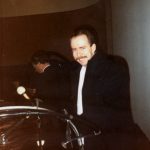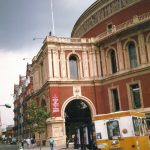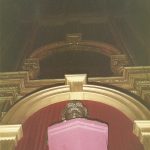My Musical Career|Part Thirty-One
1987|A Pivotal Year – Part One
Looking back over my musical life, 1987 now seems to be on of the pivotal years for both the orchestra and myself. There were several such years – 1984 – when the orchestra began recording the Tchaikovsky series for Chandos, and we began our international touring; 1987, which I’ll discuss in this post; 1993, and 1997. I’ll discuss those years later and get on with 1987. This was such a pivotal year, that this post will of necessity be a two-parter. What made this particular year special were several things. First: Personnel changes, both in the administration and in the orchestra itself; Second: Increased recording activity; and Third: Greatly increased touring activity. In fact, when it comes to this last point, the orchestra undertook more touring during the year 1987 then it had in previous years. True, it was spread out between the last half of the 1986-87 season and the first half of the 1987-88 season, but it was nonetheless a very busy year in that regard alone.
A New Orchestra Manager
I’ll start by writing about the personnel changes that occurred within the administration and orchestra. Terje Mikkelesen had been the orchestra’s personnel manager/operations manager since before I came to the orchestra, and had been doing a very fine job. He was also a fine musician and had ambitions to go further, and in the summer of 1987 (August, to be precise), he took his leave from the orchestra to pursue a conducting career (which I am happy to say he has been rather successful). His place was taken by a young, energetic Per Erik Kise-Larsen. Everybody called him by his nickname Pelle, and he brought a sweet spirit into the job with him, as well as a quiet, steady competence. The orchestra members quickly responded to Pelle’s positive outlook and he quickly became a valued member of the leadership team.
We Loose a Good Friend and Colleague – Per Melsæter – 1955-1987
On a sad note, 1987 was also a year in which the orchestra, and in particular, the percussion section, suffered a devastating loss. Per Melsæter had been the orchestra’s third percussionist since the fall of 1982. If memory serves me correctly, he had joined the orchestra after a stint as a percussionist with the Norwegian Opera. His specialty was the keyboard mallet instruments, with a particularly strong bent for the marimba. Per had been friends with, and a sort of protege of the famed American marimba virtuoso, Leigh Howard Stevens, with whom he ran a summer marimba camp each summer. Per was also a positive-thinking individual, and his attitude towards his work and his colleagues was such that he was scheduled to succeed Per Erik Thorsen as principal percussionist at the beginning of the 1987-88 season. Per Erik would remain in the orchestra, but step back to third percussion, leaving Per to run the section beginning with the new season. I had known him for roughly four seasons, and we built a pretty good relationship, having long discussions and working together as fellow members of the Norwegian Percussion Club, which Per was instrumental in getting started as a chapter of the Percussive Arts Society. As a matter of fact, Per was instrumental in having me as a clinician for the annual meetings of the Club, and I served as a board member for a couple of years under his leadership. He made no secret of his health issues. He was only thirty-two by this time, but had kidney issues, and was scheduled for a kidney transplant at some point during the 1987-88 season. Both of us were most enthusiastic about the increased recording schedule, and Per was proud of the fact that he was beginning to be given the lead assignments on the Tchaikovsky recording for EMI and the Grieg recording for CBS/Sony. We all wished each other well after the 1987 Holmenkollen concert, which was officially the last event of our season and wished each other well for the summer. Little did Per Erik, Trygve and I realize that this was the last time we’d be working with or see Per alive.
About three of four weeks into our summer holiday (called sommerferie in Norwegian), Per went up to his annual Marimba camp together with his students and co-host Leigh Howard Stevens. At some point during the camp. Per became ill and was rushed to the hospital. He had had some sort of stroke from which he never recovered. After a day or so, he was on life support. Per Erik called me at home, and while Per was technically alive, he told me that his condition was such that there was really no hope. I was so upset by the news, that I took a long walk that lasted several hours. I could not imagine a section without our good friend Per! It felt like a kick to the solar plexus, to say the least. Per held on until the first week of the new season, by which time we were rehearsing for our first BBC Prom appearance in mid-August. About mid-week, during one of the rehearsals, Per Erik took a call from the hospital, and when he returned to the rehearsal, gave us the sign as if a switch was being turned off, which meant that Per was off life support and had passed. Per’s death was hard on the whole section. To Per Erik, who had taught and mentored Per in college, it was losing a good friend and former student; to Trygve and I it was loosing a dear friend and valued colleague. It put a damper on our BBC Proms trip as the funeral would be held when the orchestra got back from London. If memory serves me well, Trygve stepped up as acting principal; Per Erik continued to perform his regular percussion assignments, and Bjørn Løken once again more than capably filled the third percussionist’s part, which he would do for the rest of the season.
BBC Proms 1987
The orchestra’s visit to the BBC Proms in the summer of 1987 was the first of what were to be many appearances there. Normally, this would have been yet another highlight for me, as I had heard about the famous summer festival held under the auspices of the BBC at the famous Royal Albert Hall in London. Founded by the late Sir Henry Wood, a noted British conductor of the late nineteenth and early twentieth centuries, the Promenade Concerts (or
Proms for short as they came to be called) were founded by Sir Henry Wood in 1895 and originally were held at the Queen’s Hall, where they were held regularly until the hall was destroyed by bombs in World WAR. They were then moved to the Royal Albert Hall, where they have been held ever since, this time under the auspices of the BBC. Today they are officially called the “Henry Wood Promenade Concerts” in memory of their founder, whose bust on front of the organ console and set over the stage area presides at the festivities.
To be invited to perform at the Proms is no small thing, and it was with the greatest pleasure that the orchestra and Mariss accepted the invitation. Since this was a special event for us, Mariss prepared a special pair of progams. Thinking ahead to the recording of Serge Prokofiev’s “Romeo and Juliet” Suites 1 and 2, Mariss scheduled them for the first half of the August 11th concert, following it with Berlioz’ “Symphonie Fantastique.”For the second program on August 12th, he choose Shostakovitch’s 6th Symphony, and followed it up with Richard Strauss’s tone poem “Ein Heldenleben.” Note that none of this is exactly light fare. This was another way for us to stretch ourselves to our limits, which actually makes for a better orchestra, and a more flexible orchestra in the long run. I used the three Light Metro Bs that we had, plus the 31 inch Light chain drum, and we took the Hingers along for Trygve to use in the Berlioz. As always, it was great to be back in the UK, especially London, and once again our old friend Ron was at the airport to greet us, although he had by this time been promoted to Mariss’s personal chauffeur. Mariss had heard about him and all the good things that we had set about “our bus driver”, so he apparently asked for him and got him. Our loss! We were put up in a much better hotel than the Royal Scot of 1984, and the nice thing that it was within walking distance of the Albert Hall. There was even enough time allotted between rehearsals and concerts for me to undertake my soon-to-be usual jaunts to Oxford Street (EMI shop) and Tottenham Court Road! Foyle’s Book Store). Playing in Royal Albert Hall was not for the fainthearted. The hall is huge and round, and it seats 6.000.
The center area is left for the many standees The acoustics are very live, but once one get’s used to them which one does surprisingly quickly, all goes fairly smoothly. In fact, for us it was a pleasure to be able to hear each other on stage for once. One of the more interesting things that happened to me that trip occurred during the interval of one of the concerts. I was walking in theofstage area, when who should I run into but my old chief conductor from Manhattan School of Music, Anton Coppola. I had not seen him in over ten years,but he still looked the same, and was glad to see me. “ I was here and was curious to see how your boy Jansons was doing. I thought I’d stop and see if I could say hello to a former student of mine.” He expressed pride in how I turned out, and spoke very approvingly of Mariss Jansons. “You have a fine conductor there. A good boy!”, he kept saying. I was a fraid he was going to tease me again about a certain note “being the best note of your career”, like he always did, but he held back and we caught up on what each other was up to over the years. As far as I know, he is now 97 years old and was active as a composer conductor until he was in his early nineties. He received the Puccini Medal for his research into the music of Giaccomo Puccini. I am glad that he was so honored. No one deserves better, and it was an honor to work under him at college. I still miss him to this day.
The concerts were a great success and yet another feather in the cap of Jansons and company, and we went back to Oslo conscious of growing musically and in flexiblity as an ensemble.
We also had to return to pay our last respects to our good friend Per Melsæter, whos’s family delayed the funeral until we could return from the BBC tour.
The funeral was well attended. Much of the orchestra and all of the Norwegian percussionists of note were there, as well as Per Erik, Trygve, myself and Bjørn. Leigh was present as well. We all commiserated, and Anders Rønningen, my good friend who was and still is timpanist with the Norwegian Opera as well as a close friend and colleague of Per’s spoke at length to each other after the service.
Some Final Thoughts
I’ll end this post here with thoughts of my good friend Per. He added much to my first four seasons in the orchestra and left great memories for the percussionists of the mid – eighties and beyond, both as a solo percussionist and marimba player of the highest standard. He was fun to be with, and while we had our disagreements, particularly politically, that did not stand in the way of friendship and making music together in the orchestra. Thanks for the memories, Per.




Recent Comments